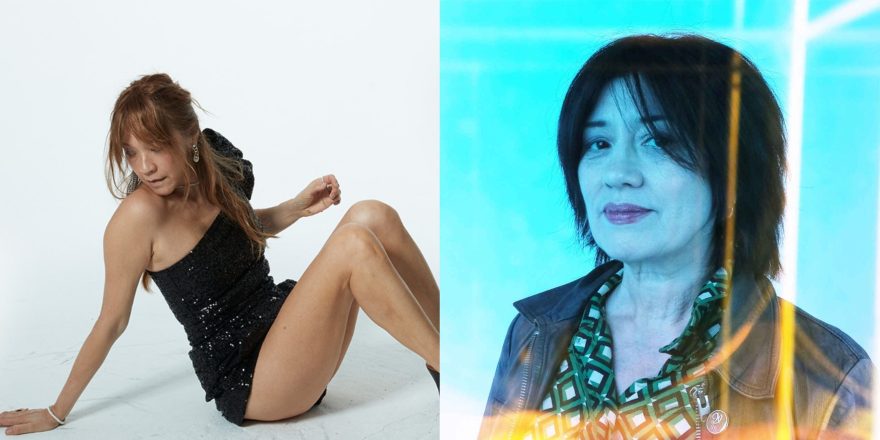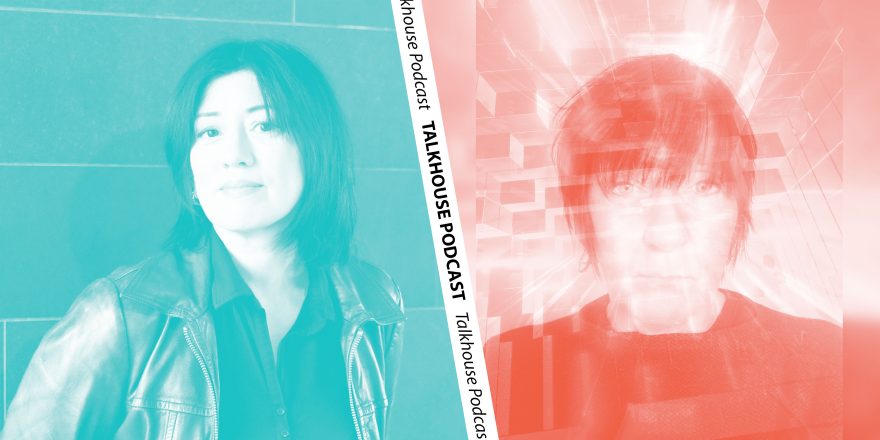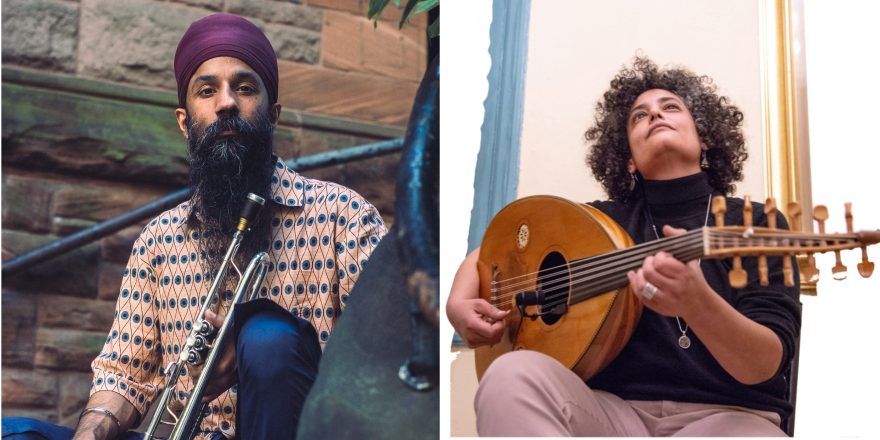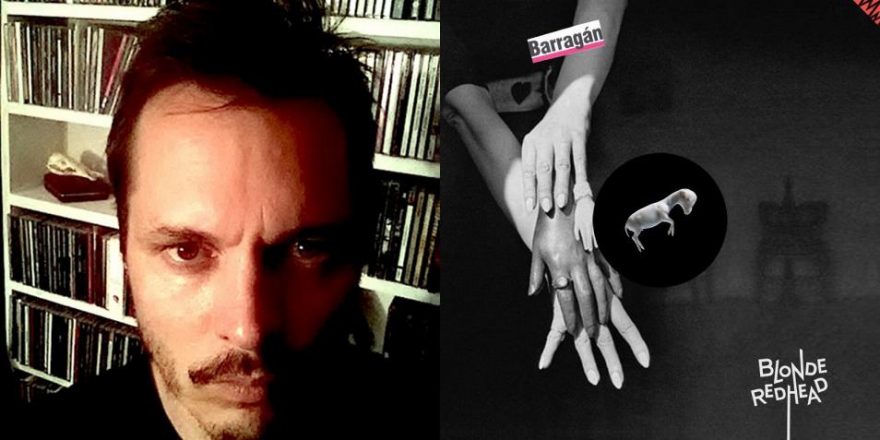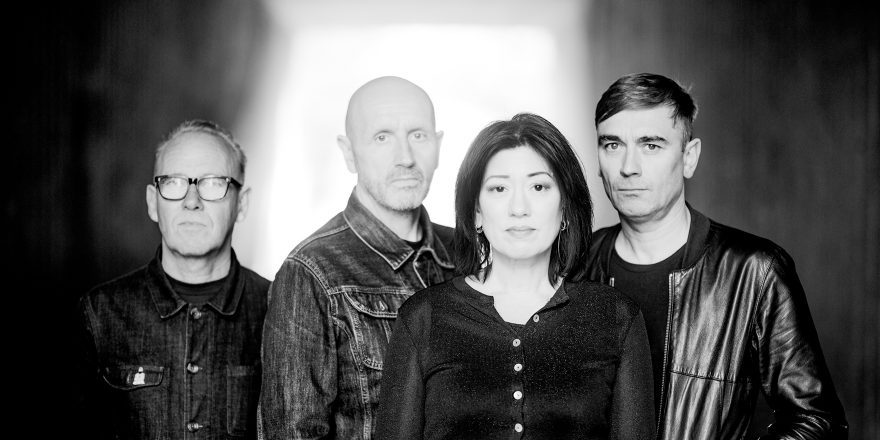Kazu Makino fronts the NYC rock band Blonde Redhead; Miki Berenyi is a singer-songwriter who fronted the shoegaze band Lush, currently fronts Piroshka and Miki Berenyi Trio, and is the author of the 2022 memoir Fingers Crossed. Blonde Redhead’s latest record, The Shadow of the Guest, came out on section1 earlier this summer, so to celebrate, Kazu and Miki got on a Zoom call to catch up.
— Annie Fell, Editor-in-chief, Talkhouse Music
Kazu Makino: The book [Miki’s memoir] really impacted me. Also — you know, I’ve known Tim Carr [A&R rep for Warner Brothers] a little bit.
Miki Berenyi: Oh, really?
Kazu: Yes, he’s the one who took me to your show for the first time. It was with, I think, Pavement. It’s a blur because I was almost high listening to your music. It just moved me so profoundly. And I think you talked about that show as well in the book, something about how fit you were musically. It makes sense — you did sound really fit musically.
Miki: [Laughs.] Yeah. It took a while to get there… But oh, my god, you knew Tim Carr! Tim was our A&R person at Warner Brothers, but he was a real music head.
Kazu: I only knew him vaguely. I could never figure him out because he was all smiley and talked so fast. I didn’t speak really good English then, so I was like, What did he say? Why is he smiling? What’s so funny? I didn’t know if he was a genuine person. But then, you know, now I know he was deeply troubled.
Miki: Yeah, I think there was some kind of addiction issues. But he was very funny. He always used to play the role of the dumb A&R guy. He was always saying to us, “That’s a joke, right?” You know, like he didn’t know. I thought he was great. He was a lovely guy. Sadly, no longer with us.
Kazu: Yeah. People often tell me, “You should write a book!” But then I always said, “I could never write it down, it would sound so scandalous that people would just think I’m making my life scandalous.” But I started reading [your book], and right away, I enjoyed it so much because we have quite common threads in a strange way. My father lived in Manchuria also, with his father. He was, I suppose, in some form of exile or something like that during World War II… I started thinking about history, how all the foreign policy and wars and all that actually does impact every one of us. It made me think, Wow, how is it going to impact all of us today? It feels remote. Yet I think all of us are going to have a severe kind of consequence from what’s happening today.
Miki: I’m sort of trying to normalize that. To me, even writing the book and going into my parents’ history in Japan during the war and Hungary during the communist invasion — all of these huge events happening — and they happen to so many people. I mean, there are wars going on all over the place now, even ones that are far distant from us. There’s something quite animal about the way that people survive these things and just keep going. Do you know what I mean?
Kazu: Mhm.
Miki: And then everybody has their stories to tell. They’re formed by it, but they’re not really crushed by it. I’m fascinated by the contrast of that. You know, Jewish people in concentration camps — I don’t know how you actually manage to get through something like that, but there are survivors who ended up having quite normal lives. I think I have quite a lot of faith in the survival instinct of people. And I don’t just mean physically surviving; I mean the networks that they create and the friendships they have. There’s something about the human race that I think in times of war, which are appalling, you can get this blossoming of incredible human nature that pulls you through it. And that gives me hope, because I think there are people who went through far worse things than I ever probably will, and it’s good to know that people manage to get through that.
Kazu: It’s true. It shows in the book, how strong you are. I was reading the beginning of it, and I was still saying to myself, Wow. I couldn’t write my own because I couldn’t write what happened to me down, and then it turns out you went through just as much or worse. It was shocking to me. I was like, Oh, my god, she did write it down. I went through the whole book, and at times I almost had to hold myself back from crying. But then when you read the ending credit, I burst into tears, because the discipline that you had to wrap up the book was so profound to me. That was really amazing.
Miki: I think that says more about you than it does about me.
Kazu: [Laughs.] Yeah, it’s true.
Miki: I know people say, “It must have been so difficult to write it down!” And I have to say, I had a publisher who was pushing me the whole time and encouraging me. There’s no way I would have done that on my own. And I do actually think, like you say, when you think about doing your own life story, there’s a sort of flood of confusion — because there’s many ways to tell an event. There’s an emphasis on different aspects of it. I did a lot of rewriting and a lot of editing. It’s not just for you, it’s for the reader, and there’s all these sort of tweaks and thoughts that go on. I have to say, it’s quite therapeutic. [Laughs.] I do recommend it, if you ever decide to do it. I think sometimes, the really big traumatic events are the things you might be the most scared of writing down, but actually, I think some of the best bits are in the kind of nuances in between. And sometimes they’re quite small things that resonate more, rather than the big headline drama.
Kazu: True…
Like you were saying [before we started recording], I’m in a place now where I wasn’t supposed to be, because I was supposed to be with my really long time friends that we spend time together like a family. But my close friend’s husband is Jewish — and he’s great. I love him just as much as I have loved him before. But since I’m quite active in protest, and speaking out on behalf of oppressed people, he doesn’t feel comfortable. We were trying to still stick it out, but something I said just was a last straw for him. So I’m here in sort of unknown territory. And I’ve already met really nice people. It’s really unbelievable for me to listen to people talking about recipes or really mundane things — just the details of everyday survival, it’s mind-boggling to me. I always think, I feel like I’m in Jane Austen’s book. Maybe this is a survival skill, that you go into the details of life and just get through small things, and then not really think about the big picture.
Miki: I think people deal with things in different ways. I think for some people, getting very involved with a political cause and exploring it and occupying themselves with it feels quite cathartic. You feel like you’re making progress, that something is giving value. You know you’re using your time valuably and that can be very energizing and good for the soul. I do understand people who feel overwhelmed by that, that a problem that they cannot possibly solve on their own is genuinely depressing for them. Everybody has an internal world that they keep quite private; some people really are on the edge of coping. Some people aren’t — some people seem to fucking cope with everything. And maybe they are completely empty, I have no idea. But I sort of understand people who feel they just don’t want to talk about those sort of subjects.
I’m really sorry that you’ve got a friend who finds it so difficult to talk about those things, because I think the only way that these things do get solved is by people being able to communicate over that divide. I don’t really hold with the kind of, “Oh, I can’t talk to them because they’ve got the wrong opinions.” I mean, I grew up surrounded by the wrong opinions. My dad totally loved Margaret Thatcher. [Laughs.]
Kazu: Is that because he didn’t know enough about her?
Miki: Well, I think it’s because he went through a communist invasion in Hungary, so he had a real fear of anything that even looked like that. I disagreed with him and we would argue about it, but I kind of always understood where he was coming from and why that was so difficult for him.
I don’t really understand the idea of breaking friendships over political opinions or religious opinions or anything like that, when you know that person is a good person. I just think that even if it’s a struggle, even if it means taking a break, there’s going to be a way to get through where you can communicate on that. I mean, right now it’s a really hot topic. I get that. And people are very polarized and everybody feels like a victim on each side, and they’re being accused of things that they feel very defensive about. So I do understand that. But I do think that a friendship counts for an awful lot.
Kazu: It really does feel like a critical moment. The world is really changing, shifting drastically. And then all of us are affected. That’s what it feels like. I don’t even want to say “war,” because I don’t I don’t see it as a war. I think the people who cannot talk about it, [who are] looking away — they just must have so much fear, looking at things for what it is.
Miki: I think sometimes people don’t want to talk about it because they’re not confrontational. And I do think that is quite difficult, because you have to be able to feel that you might be disagreed with. You have to feel that you are going to have to open your mind to something. And not everyone is capable of that, I think, because they take it as a personal threat and an accusation. And it’s very difficult to talk about something when you are far removed, actually. You can go round and round in circles. But I still think it’s all worth exploring that, and I think we can all be compassionate about suffering. I think that’s undeniable — I don’t think you would find anyone on either side of this kind of discussion who thinks it’s a great thing to have, you know, children dying and the absolute genocide of a people. Whatever the history and the context is, it’s obviously never a good thing. But with something like Israel-Palestine, I do think people get defensive.
Kazu: Yeah. I mean, I don’t see myself like a political person. But I flip out when I see — I see it as a humanitarian crisis. But then in order for me to talk about it, even though nothing is happening to me, you need to know what you’re talking about. So I end up reading as much as I can about everything. And I find it quite interesting. Each country has a personality. It’s almost like an extended version of what happens in relationships.
Miki: I’m half-Hungarian, half-Japanese. I was brought up in Britain. I am a visitor when I go to Japan or Hungary. I actually feel more English than I feel anything else, if I’m totally honest. I think even claiming that there is a racial characteristic to human beings — I mean, yes, there are physical differences, whatever — but to me, it’s much more about culture. So you can take someone from whatever background and you can raise them in a country that they had absolutely nothing to do with for the entirety of human existence, and they will turn out quite similar to a lot of the people who live there. There will be things that might affect that, because they might not have been accepted completely. But to me, it is so much more about cultural differences. So when race comes up, I just think it’s ridiculous. It’s sort of completely irrelevant… My issue with a lot of the Palestine and Israel and all of this is it does boil down a lot to religion and race, which is a concept I just can’t really get around. My experience is people intermarrying. I know people whose parents are Jamaican and Australian and wherever the fuck they come from, and they’ve just all bounced together and then created children. That’s my vision, you know? So these very divided things, I don’t really get it.
Kazu: Yeah, I don’t know. I thought I knew a lot more, but there’s just so many things I can’t quite put together…
Miki: It’s difficult, isn’t it? Because if you look at the history of people, I think that the Jews have suffered immense persecution over the centuries. Pogroms, 6 million of them slaughtered. There’s a sort of element of, “OK, so you feel like you have to repopulate your people.” While I understand, this idea of “my people” — my Japanese people, my Hungarian people — it’s just not my worldview. To me, it is just bombs falling, people being killed. It’s just fucking horrible and it needs to stop. And I’m not even going to be “both sides” about it, because clearly one side is incredibly well-armed, which makes it doubly difficult…
Kazu: I just think if you hang on to that victimhood, there’s just endless amounts of tragedy. Like for Japanese people, Black American people, Native American people — I mean, it’s just everywhere then.
Miki: It’s a fine balance, isn’t it? Because I do think that the idea of victimhood, letting it overwhelm you — and that doesn’t even have to be race. If you’re a woman and you’ve undergone terrible things… I mean, the world is fucking unfair, let’s face it. And there is absolutely no doubt that it is harder to be a woman in many, many ways. I’m not saying that the richest woman on earth is worse off than the poorest man on earth, but there’s just a general feeling that it is a man’s world and the rules are made to highlight that. But I think if you let it completely burden you to the point where you can’t interact with people because you’re always suspicious or you feel that you’re always going to be criticized, I think that that is very debilitating. But at the same time, not acknowledging it is almost playing into their hands.
Kazu: Yeah. I mean your story really made me think, Are we all raped? Not just the people talking about it, but did everybody get raped? I started thinking that maybe it’s not that unusual.
Miki: Right. And I think when those things are normalized, then it’s very difficult to actually change anything, because it’s seen as just part of the fabric of life. Like, it’s not a big deal, but it’s a really fine balance to acknowledge these things and still be able to move through life and not let them completely crush you. And also to not have any compassion for someone else’s version of that — there are people who have their own struggles, and that might be about mental health, or it might be about race, or it might be about money.
Kazu: For me, the moment that you move through time without any effort — you’re not thinking much, analyzing yourself, or not feeling yourself much — I think that is what happiness is for me. I think that’s how I dealt with it, through not being completely aggressive about, “I’m a woman, don’t touch me.” I just wanted to be somewhere in between, not really present myself as a female. I never thought about it like that. Or even even being Asian, a Japanese person — so often, people will say, “I have an Asian only fanzine, can you talk?” And then I’d be like, “I can, but I have nothing to say.” Or in the music industry, I’ve already accepted that this is probably the most predatory industry. Everybody’s enraged about Spotify, and I’m thinking, As if injustice started today. It’s not like you have somewhere else to go that you’re not going to get fucked with. It’s just the way it works. I just think that kind of hysteria doesn’t help anybody. If you’re gonna do something, make sure you give them a really serious blow, you know?
So in a way, I want to be kind of ethereal and invisible, but then there is rage and fury inside me as well.
Miki: I haven’t even fucking talked about your bloody music or anything.
Kazu: [Laughs.] It’s your fault! Your book — I have to say, the music part was great too, but I really, really love all the parts into it. It just was so moving for me.
Miki: Well, I just want to say that I have been listening to your record and it is absolutely beautiful. I really love it, and I had loads of questions to ask you, but we’ve only got two minutes left.
Kazu: Thank you. I still remember the moment I listened to you, I was like, Ah, OK, this is where I want to be. You have such a special place for me.



